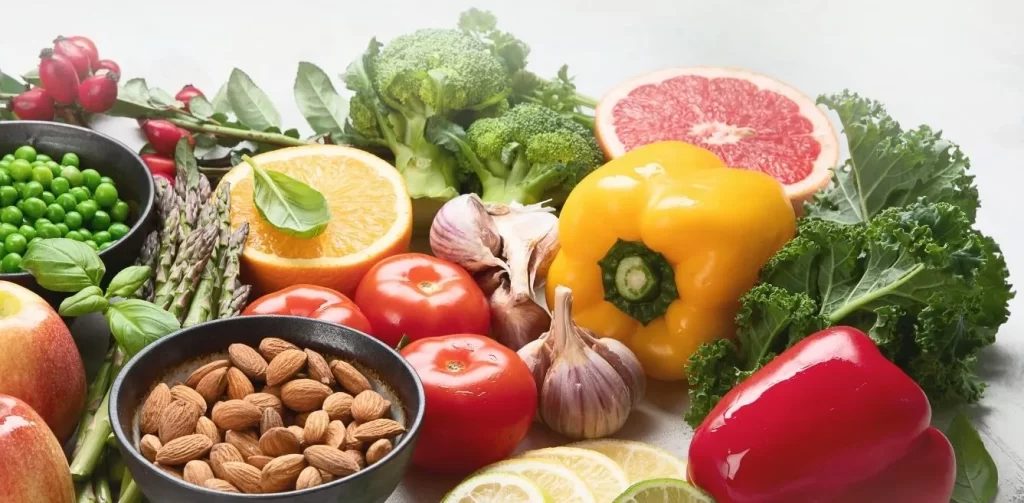The Top Foods for Boosting Your Immune System

Boosting the immune system is one of the hotter health topics right now. With the COVID-19 pandemic and the flu season in full swing, many are looking for ways to stay healthy.
Registered dietitians offer up a variety of foods to help support the body’s natural immunity process. Some of the top immune-boosting foods include salmon, berries, turmeric, and kefir.
Spinach
Whether it’s a kale salad or a smoothie, this leafy green is packed with nutrients that boost immunity. The antioxidants it contains — including vitamin C and potassium — help fight off infections.
You’ve probably guzzled orange juice when you’re sick, but it turns out other fruits are good for your immune system, too. Kiwi and berries, for example, are rich in vitamin C.
Chicken soup is an old-fashioned favorite, and it’s also packed with immune-boosting ingredients. Research suggests that the amino acid cysteine found in chicken broth chemically resembles the acetylcysteine that helps relieve cold symptoms and thins mucus.
Broccoli
With the COVID-19 pandemic and respiratory syncytial virus, or RSV, on everyone’s mind, many people are looking for immune-boosting supplements and foods. Registered dietitians agree that a well-balanced diet full of nutrient-rich foods is the best way to stay healthy.
Broccoli contains vitamin C, which stimulates the formation of antibodies to fight infection. It also contains sulforaphane, which activates the Nrf2 protein to boost the function of immune cells and reduce inflammation.
Eat broccoli raw to maximize its immune-boosting benefits. You can also add it to soups, stews or a grain bowl.
Red Bell Peppers
Sweet potatoes are another source of Vitamin C and offer a boost of immune-supporting beta carotene. Try adding them to soups and stews or roasting them in the oven for a quick side dish.
Vitamin C may reduce cold symptoms and increase the effectiveness of your immune system’s infection-fighting abilities. A cup of oranges contains about 50 mg of Vitamin C while a cup of strawberries provides about 90 mg.
The fat-soluble Vitamin E in seeds, nuts and avocado is also good for your immune system, says Fine. Sprinkle them into warm oatmeal, your favorite salad or a grain bowl or use them to make a creamy nut and seed dip.
Blueberries
Blueberries are packed with antioxidants, which enhance immune function. A study in the journal Applied Physiology, Nutrition, and Metabolism found that people who consumed about two cups of blueberries per day had higher levels of natural killer cells—the immune system’s first response to virus-infected or tumor cells.
Beta-carotene, which converts to vitamin A, is another immune-boosting food. Carrots, apricots, spinach and kale all contain this beneficial phytochemical. Aim for about four servings of these foods per week. Vitamin E, which is fat-soluble, can be found in nuts and seeds, as well as avocado, spinach, broccoli and whole grains. You can also get this nutrient by sipping green tea or by drinking juices like pomegranate or kiwi.
Dark Chocolate
We’ve all heard that chicken soup and tea can help a cold, but what about boosting your immune system from the inside out? Immunity-boosting foods deliver vital nutrients to keep you healthy and help you bounce back faster when illness strikes.
Add vitamin C-rich foods like oranges and kiwis to your diet for the best source of this immunity booster. Red bell peppers are another great option and can be eaten raw, stir-fried or roasted for better absorption.
Avoid processed and refined foods that may undermine your immune system by increasing oxidative stress or contributing to inflammation. Enjoy dark chocolate, but stick to a small serving to get the best benefit.
Green Tea
The nutrient-dense tea contains polyphenols, which help the body fight infection and illness. Try sipping a cup of green tea everyday or adding it to your favorite smoothies.
Vitamin C is one of the immune system’s best friends, and eating a variety of foods rich in this vitamin may shorten common cold symptoms, research suggests. Red bell peppers, kiwis, and oranges all contain vitamin C, as well as other antioxidants like lycopene, which promotes healthy blood vessels and boosts immune function.
Leafy greens, carrots, apricots, and squash are packed with beta-carotene, which converts into vitamin A to keep antibodies working properly. Also, eat beef, such as flank steak or sirloin, up to three times per week, which provides zinc and selenium.
Vitamin D
The vitamin D that kiwis and eggs supply, along with other fortified cereals, helps your body make calcification cells that form barriers against bacteria and viruses. It also helps your immune system “recognize” and kill those invaders, Weiler says.
Protein-rich foods such as meat, poultry, dairy and beans provide the zinc your immune system needs to function properly. Zinc also helps your white blood cells do their job by destroying invading germs, Weiler says. Add selenium-rich sunflower seeds to your diet, too. They contain both vitamin E and zinc, making them an immune-boosting snack.







